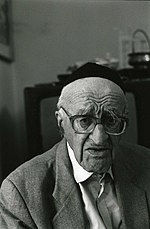Yeshayahu Leibowitz

Yeshayahu Leibowitz (Template:Lang-he 1903–1994) was an Israeli philosopher and scientist known for his outspoken, often controversial opinions on Judaism, ethics, religion and politics.
Biography
Yeshayahu Leibowitz was born in Riga in 1903. In 1919, he studied chemistry and philosophy at the University of Berlin. After completing his doctorate in 1924, he went on to study biochemistry and medicine, receiving an MD in 1934 from the University of Basel. He immigrated to Mandatory Palestine in 1935 and settled in Jerusalem. Leibowitz was married to Greta, with whom he had six children.[1] His son, Elia, was chairman of the Tel Aviv University astrophysics department and the longest-serving director of the Wise Observatory.[2] Another son, Uri, was a professor of medicine at Hadassah University Medical Center.[1] His daughter, Yiska, is a district prosecutor.[1] His sister, Nechama Leibowitz, was a world famous biblical scholar.
Yeshayahu Leibowitz was active until his last day. He died in his sleep on August 18, 1994.[3]
Academic career

Leibowitz joined the faculty of mathematics and natural science of the Hebrew University of Jerusalem in 1936. He became a professor of biochemistry in 1941 and was promoted to the position of senior professor of organic chemistry and neurology in 1952. He taught at the Hebrew University for nearly six decades, lecturing in biochemistry, neurophysiology, philosophy and the history of science.[3]
Religious philosophy
Leibowitz was an Orthodox Jew who held controversial views on the subject of halakha, or Jewish law. He wrote that the sole purpose of religious commandments was to obey God, and not to receive any kind of reward in this world or the world to come. He maintained that the reasons for religious commandments were beyond man's understanding, as well as irrelevant, and any attempt to attribute emotional significance to the performance of mitzvot was misguided and akin to idolatry.
Leibowitz was a staunch believer in the separation of state and religion. He believed that mixing the two corrupted faith. He condemned the veneration of Jewish shrines, cynically referring to the Western Wall as the Discotel (a play on the words "discothèque" and "Kotel").[3]
In contrast to his strict views on some religious matters, he was surprisingly liberal in others. On the subject of homosexuality, for example, Leibowitz believed that despite the ban on homosexual relations in Judaism, homosexuals should do their best to remain observant Jews.[4]
Lectures and published work
Leibowitz served as the editor of the Encyclopaedia Hebraica in its early stages. Apart from his innumerable articles and essays, Leibowitz authored a wide range of books on philosophy, human values, Jewish thought, the teachings of Maimonides, and politics. Many of his lectures and discourses, including those given as part of the "Broadcast University" project run by Israeli Army Radio, were subsequently compiled and printed in book form. Leibowitz was a prolific letter-writer and his advice or comment was sought out widely. A first collection of his letters (in Hebrew) was published posthumously.
Political views
Leibowitz was an outspoken critic of Israeli values and national policy. His remarks accusing Israeli soldiers of a "Judeo-Nazi" mentality provoked a public outcry amongst Israelis. While such remarks led some to conclude that he was an anti-Zionist, Leibowitz repeatedly affirmed his belief in the validity of the Zionist endeavor, both in writing and in conversation, throughout his life.[citation needed]
Israel Prize
In 1993, he was nominated for the Israel Prize. Before the award ceremony, Leibowitz was invited to speak to the Israel Council for Israeli-Palestinian Peace, where his controversial remarks calling upon Israeli soldiers to refuse orders triggered outrage (and Yitzhak Rabin had threatened to boycott the ceremony. The jury convened to discuss the possibility of withdrawing the prize, but Leibowitz himself announced that he would refuse to accept it, because he did not want to create antagonism when receiving the prize.[5]
References
- ^ a b c Confessions of a litigation commando - Haaretz - Israel News
- ^ Templeton Research Lectures on the Constructive Engagement of Science and Religion :: Speaker Bios
- ^ a b c Yeshayahu Leibowitz, 91, Iconoclastic Israeli Thinker - New York Times
- ^ Journal of Homosexuality, volume 52, issue 3/4, Gay, Orthodox, and Trembling: The Rise of Jewish Orthodox Gay Consciousness, 1970s-2000s, by Yaakov Ariel
- ^ Uri Avnery: Israel's Conscientious Objectors
External links
- Israel Prize for special contribution to society and the State recipients
- Israeli Orthodox Jews
- Israeli scientists
- Israeli philosophers
- Hebrew University of Jerusalem faculty
- Jewish philosophers
- Philosophers of Judaism
- Latvian Orthodox Jews
- Israelis of Latvian descent
- People from Riga
- People from Livonia
- 1903 births
- 1994 deaths
